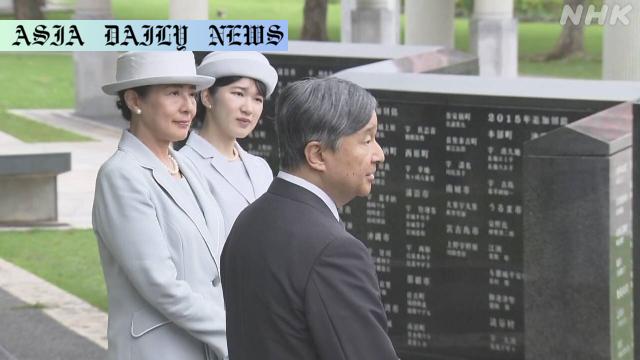Okinawa – Japan’s Imperial family pays respects to war victims, marking the 80th anniversary of the Battle of Okinawa.
Japan’s Emperor, Empress, and Princess visit Okinawa for the war dead commemoration.
The visit marks 80 years since the Battle of Okinawa, honoring war victims and bringing awareness to the younger generation.
The Imperial family met war survivors and relatives, offering prayers and words of encouragement for peace.

Remembering Okinawa’s Historical Significance
The Battle of Okinawa remains one of the most poignant and tragic chapters of World War II. This year marks its 80th anniversary, and Japan’s Imperial family has undertaken a heartfelt visit to the region to honor the memory of those who perished. Emperor Naruhito, Empress Masako, and Princess Aiko collectively paid their respects at the Peace Memorial Park in Itoman City, the site of the war’s final battles. The family visited the National War Dead Peace Mausoleum, a repository of the remains of over 180,000 individuals, ensuring dignified remembrance remains at the forefront of Japanese consciousness.
This solemn visit carries profound significance as it reaffirms the family’s commitment to preserving the memory of the war’s devastating legacy. It is a unanimous acknowledgment of the pain and sacrifices endured by Okinawa’s residents, whose lives were irrevocably changed. For Princess Aiko, this visit represents an opportunity to engage with history in person, understanding the gravity of war through both personal and collective narratives. The inclusion of younger generations like Princess Aiko in such ceremonies reinforces the continuity of remembrance and the importance of educating the future custodians of history.
Offering Solace and Commemorating Sacrifice
The ceremonies observed by the Imperial family centered around offering comfort and recognition to the families of the war dead. At the mausoleum, Emperor Naruhito and his family solemnly laid a bouquet in honor of those whose lives were lost. Notably, they also visited the Cornerstone of Peace, where more than 240,000 names of the deceased are etched—a sobering reminder of lives claimed by war. The Imperial family took a moment to reflect on the newly inscribed names added this year, further highlighting the ongoing efforts to ensure no soul remains forgotten.
The family’s visit to the Okinawa Prefectural Peace Memorial Museum further demonstrated their commitment to understanding the depth of the tragedy. Engaging with survivor accounts brought them close to the personal and human aspect of the battle, transforming historical statistics into real, heartrending narratives. Survivors like Arakaki Ikuo and Chinen Yukichi shared not only their grief but also their aspirations for a world devoid of war. Such encounters remind us that while the scars of the past remain, they also serve as a wellspring of wisdom and a call for collective peace.
Promoting Peace through Education
The significance of the 80th-anniversary commemoration lies not only in its remembrance but in its clarion call for education and peace. By spreading awareness of the Battle of Okinawa’s aftermath, the Imperial family underscores the necessity to convey these realities to younger generations. As Chinen Yukichi poignantly noted, bridging the gap between historical occurrences and the present requires commitment and the willingness to share difficult truths.
The Imperial family’s visit serves as a potent reminder of the devastating consequences of war and the shared responsibility of nations and individuals to promote harmony. As Princess Aiko grows into her role, her presence during historic events like these will position her as a key figure in Japan’s ongoing initiative to foster global peace. Furthermore, the family’s interactions with the local community reiterate the human connection in historical remembrance—showing that while history may cast long shadows, unity and understanding can pave the way toward brighter, peaceful horizons.
The visit of Emperor Naruhito, Empress Masako, and Princess Aiko is not merely a ceremonial obligation but a heartfelt act of remembrance that seeks to ensure horrific events of war are never repeated. As history continues to unfold, this act of commemoration will serve as a reminder that even amid the devastation, the light of humanity and peace can prevail.
Commentary
The Significance of Remembering History
The visit of Japan’s Imperial family to Okinawa on the 80th anniversary of the Battle of Okinawa holds immense symbolic value. It is not just about commemorating the dead but also about recognizing the lessons history imparts. In a world where the realities of war often feel distant, such acts serve as a bridge between past and present. They remind us that the peace we cherish today was built upon sacrifices made decades ago. The participation of Princess Aiko alongside Emperor Naruhito and Empress Masako further personalizes this journey back in time, bringing a multigenerational perspective to an enduring memory. It’s a hopeful gesture—uniting old and young in the pursuit of understanding and compassion.
The Role of Leadership in Preserving Memory
One of the most profound aspects of the Imperial family’s visit to Okinawa is the empathy they bring to their role. By interacting directly with survivors and relatives of the fallen, they humanize the often-faceless narratives of history. The dialogue they create acknowledges not only the scale of tragedy but also the deeply personal stories of loss and resilience. This empathetic approach underscores the monarchy’s relevance in modern times, breathing life into historical remembrance while offering words of support and encouragement to those still grappling with wounds from the past.
Peace as a Shared Responsibility
Perhaps the most moving outcome of this visit lies in its message of peace and reconciliation. The Battle of Okinawa is not just a Japanese tragedy but a global one—highlighting the horrors of war and the urgent need for peace. The Imperial family’s commitment to spreading this message, especially to younger generations, is essential in a world where the specter of conflict looms. It challenges each of us to do our part, whether by learning from history, fostering dialogue, or standing against division. Their visit is a call to action—a reminder that peace is not solely the domain of world leaders, but a shared responsibility for all humanity.


